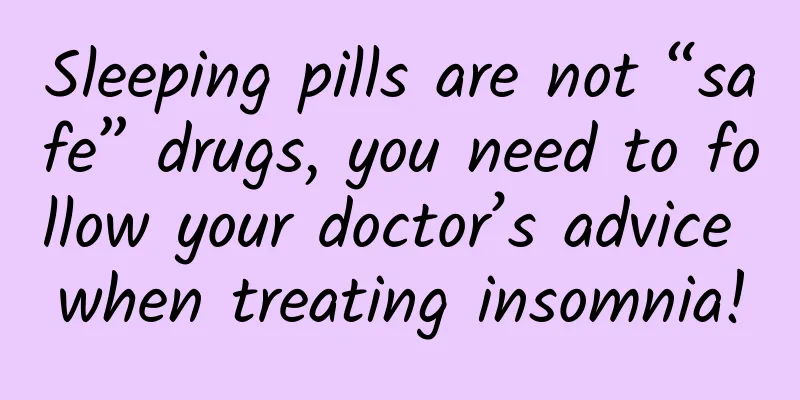Sleeping pills are not “safe” drugs, you need to follow your doctor’s advice when treating insomnia!

|
Author: Jiang Zhe, Deputy Chief Pharmacist, Harbin No. 1 Specialized Hospital Li Yang, deputy chief physician, Harbin No. 1 Specialist Hospital Reviewer: Fan Qinyi, Chief Physician, Harbin No. 1 Specialist Hospital 1. Treating insomnia, can a long-term illness make one a good doctor? A female patient in her 50s came to the clinic and said that she felt much better after taking sleeping pills for a month and asked the doctor to prescribe some more. The doctor carefully asked about the patient's condition. The patient was in menopause and had been busy at home for a while. She always had trouble sleeping. She came to the hospital several times and the doctor prescribed sleeping pills for her. The effect was very good. This time, she felt that she didn't need the doctor's diagnosis and treatment, and she knew what medicine to take. Figure 1 Copyright image, no permission to reprint So, will the doctor continue to give her sleeping pills as requested by the patient? It is not difficult for the doctor to judge whether the patient needs to continue to use sleeping pills from a professional perspective. However, in terms of insomnia treatment, the patient gradually "becomes a good doctor after a long illness". At present, it is more important to make the patient understand and accept that she does not need to continue taking sleeping pills in her current state, and can improve her sleep through other methods such as emotional regulation, massage relaxation or Chinese medicine conditioning. 2. Are sleeping pills safe? There are many drugs used clinically to treat insomnia. For short-term use, zolpidem, zopiclone, eszopiclone, zaleplon, etc. are the first choice. For patients with chronic insomnia, estazolam and alprazolam may be used, or for patients with anxiety, diazepam, lorazepam, oxazepam, etc., several types of drugs have one thing in common: they are all Class II psychotropic drugs controlled by the state. Figure 2 Copyright image, no permission to reprint Category II psychotropic drugs act on the central nervous system and have dependence and tolerance. Dependence means that if you stop taking the drug after a period of use, you will worry that not taking the drug will affect your sleep, and your body may not adapt for a few days, so doctors usually gradually reduce the dosage until you stop taking the drug; while tolerance means that after a period of use, the original dose may not work well or be ineffective, and you need to increase the dose to achieve the original effect. It is precisely because of this characteristic that in recent years some people have overdosed and abused frequently, crossing the line between drugs and narcotics, and even abused and privately sold state-controlled narcotics. In serious cases, they have been criminally punished for drug trafficking. The hospital strictly limits the time and dosage of psychotropic drugs. For patients like this, who use them in a short period of time to get through the acute stage of insomnia and have their symptoms alleviated, they can switch to other methods such as psychological counseling, physical therapy, Chinese medicine regulation, diet regulation, aromatherapy, etc. to improve sleep and ensure the safety and effectiveness of drug treatment. Figure 3 Copyright image, no permission to reprint Patients with chronic insomnia who use such drugs for a long time need to go to the hospital for regular evaluation. The doctor will judge the safety and effectiveness of long-term use and develop an individualized medication plan. There are many other drugs for treating insomnia in clinical practice, such as sedative antidepressants, antihistamines, melatonin and melatonin receptor agonists, antipsychotics, etc., which are not the first choice and need to be selected by doctors based on diagnosis. In general, the elderly sleep shorter hours at night than young and middle-aged people. Only after a doctor diagnoses them with insomnia will they consider using medication to adjust their sleep. Most elderly people use combined medications, and it is necessary to pay attention to the interactions between several drugs. Regular follow-up visits should be conducted to adjust the dosage and type of medications, and liver and kidney function should be checked to avoid damage caused by drugs. Of course, there is no need to be afraid of drugs. Although sleeping pills, which are Class II psychotropic drugs, are addictive and have tolerance, they are still the first-line treatment for patients with severe insomnia and acute insomnia. Their efficacy has been confirmed. Strictly following the doctor's orders and not overdosing in the short term can ensure the safety of the medication. |
<<: Game addiction: Beware of the "mental addiction" in the digital age
>>: How much do you know about surgical treatment of Parkinson's disease?
Recommend
How long after a miscarriage can I start exercising and losing weight
There are many ways to lose weight nowadays, incl...
What are the functions and uses of food additive citric acid? Is citric acid soluble in ethanol?
Citric acid is an important organic acid, also kn...
Women can do old jobs
There are always some jobs that are more suitable...
Top 10 calcium-supplementing foods for pregnant women
During pregnancy, you must pay attention to calci...
Pictures of Candida vaginitis
Vaginal candidiasis is an extremely complicated g...
The fetal movement is on the right side, is it a girl?
If a woman does not take contraceptive measures d...
Can pregnant women use lotion to wash?
Since women have more secretions from their genit...
How to remedy the situation when having sex during menstruation? Hygiene is important
First of all, I would like to remind everyone tha...
Continuous high menstrual basal body temperature
When your body temperature is abnormal, you shoul...
Brown discharge one week after menstruation
When women reach those "few days", thei...
What should I do if I feel chest tightness, upset and irritable after miscarriage?
In life, there are many women who suffer miscarri...
About 3 million children are troubled by autism! Parents should be alert if their children have these conditions!
Author: Sheng Juan, deputy chief physician of Jin...
What is the highest degree that can be obtained through correspondence education? Can I take the CPA exam with a correspondence education?
Correspondence education is a form of adult colle...
What should girls do when they reach puberty?
Everyone will encounter puberty. Many people may ...
What should pregnant women do if they get angry in the early stages of pregnancy?
For ordinary people, if you have a sore throat, y...









